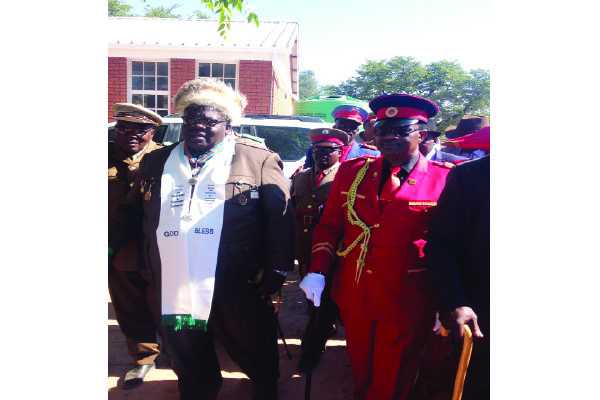Ovambanderu and OvaHerero leaders preach peace and unity
The Paramount Chiefs of the Ovaherero and Ovambanderu were at odds this past weekend in their narration of the two tribes’ history. The two tribal leaders who in a rare occasion appeared together for an event varied in their narration of the two tribes’ history especially on how they were affected by the German genocide of 1904. They were both invited to speak at a Herero Cultural Day in Mosu over the weekend organised under the theme: Our Culture our Unity.
Paramount Chief of the Ovambanderu Traditional Authority Kilus Karaerua Munjuku III Nguvauva who was the first to speak, acknowledged that there is rivalry between the two tribes. The Ovaherero and Ovambanderu speak the same language and have the same cultural practices.
According to Munjuku III, “the rivalry between the two tribes that we observe today amongst our people was brewed and promoted by the German colonialists through their super policy of divide and rule. That was a narrow selfish tactic intended to advance the Germans’ own benefit and not for any of the two tribes.”
He pleaded that, “we have a duty” to collectively cleanse and rinse and erase the rivalry from all our systems with the ultimate aim of going back to our olden days of peace and harmony. “Our greatness as Ovambanderu and OvaHerero leaders should not be measured by the number of fights we have won within or against each other, but by our ability to build peace and harmony within our people,” he said.
Speaking about the German/Herero war of 1904–07, that resulted in the deaths of about 80 percent of the Herero population, and considered by most scholars to be genocide, the Ovambaderu Chief said the Ovambanderu people suffered tremendously under the German colonial rule because they were the first to be targeted by the Germans.
“However, the Germans first came into contact with the Ovaherero as they arrived on boats from the coast through Otjimbingue, Omaruru and Okahandja. When they trekked further east of Windhoek, they came across the Ovambanderu and realised the similarities in the language the Ovambanderu and Ovaherero were speaking,” he said.
Furthermore, according to him, the German atrocities started in areas under the jurisdiction of the Ovambanderu people and the first battle was waged at Epako (Gobabis) in 1896, which culminated in the death of a German Lieutenant named Lt. Lampe. This incident led to the battle at Otjunda and the public execution of “my great grandfather, King Kahimemua Nguvauva.”
Said the Chief, “Thus, it all started with the Ovambanderu people as usual who were the first to suffer the consequences of the German forces of colonisation.” He further noted that after the execution of his great grandfather, the Ovambanderu were subjected forcefully under the rule of Chief Samuel Maharero of the Ovaherero.
“The Ovambanderu people were persecuted and made to pay for war damages, which later forced them to claim to be Ovaherero in order to save their lives and property as about 12, 000 cattle were confiscated from the Ovambanderu people. This is how the language spoken by the Ovambanderu people came to be referred to as Otjiherero due to the German insistence.”
He said during the battles of 1904 that led to the declaration of genocidal activities by the German Schuttstruppe the Ovambanderu were brutally killed under the auspices of Ovaherero, because the Germans regarded Ovambanderu as Ovaherero people hence the exclusion of the Ovambanderu people from the extermination orders of Lothar Von Trotha (German military commander.)
Munjuku III speech prompted Advocate Vekuii Rukoro, the Ovaherero Paramount Chief to call his group of advisers to what looked like a short caucus meeting.
When it was his turn to speak Chief Rukoro first gave the platform to the secretary of the Ovaherero Traditional Authority, Bethuel Katjimune who went on a rebuttal mode stating that the Ovaherero are the ones who through a conference at Otjikururume in Namibia made a resolution to fight the Germans.
The resolution was made because the Ovaherero noted that the Germans were taking their land and cattle. “By then we had only one paramount chief, the leader of the Ovaherero people, Samuel Maharero. He is the one who advised that people should get livestock and buy arms in Cape Town. Unfortunately in January 12, 1904 the war started in Okahandja, a Herero territory.”
For his part Chief Rukoro said Ovaherero is just one tribe with different clans or communities. “We are one tribe, our culture is the same,” he said





